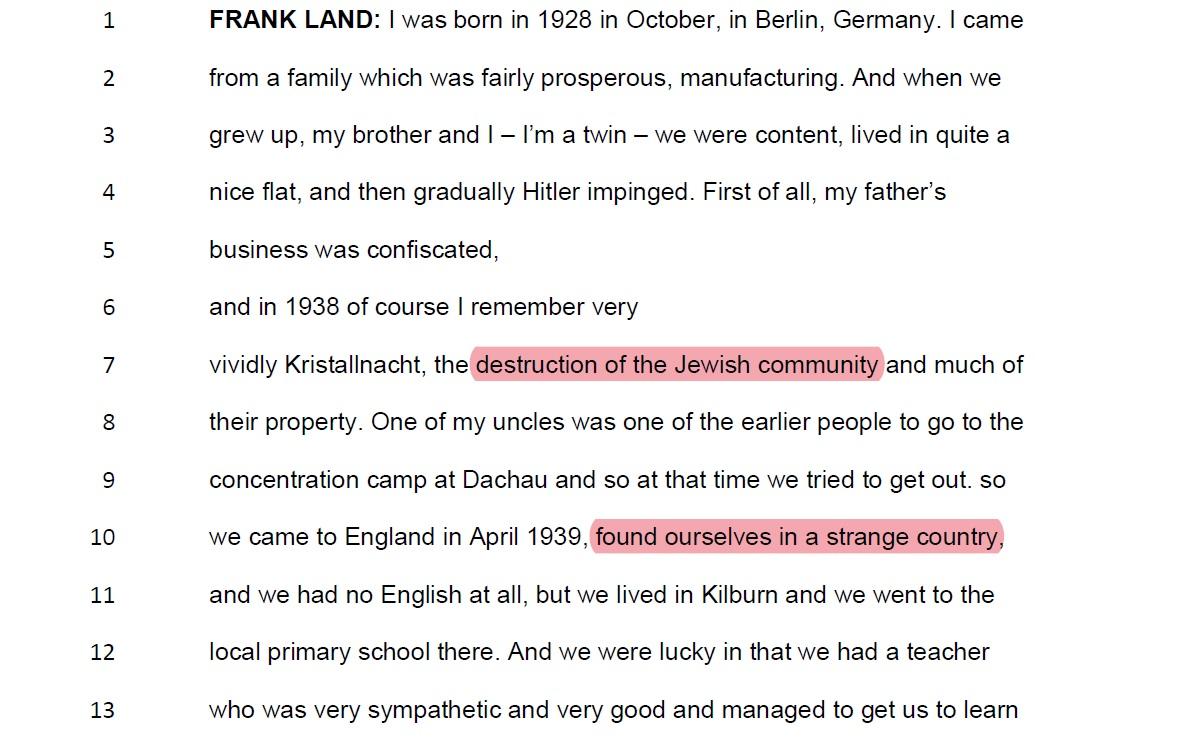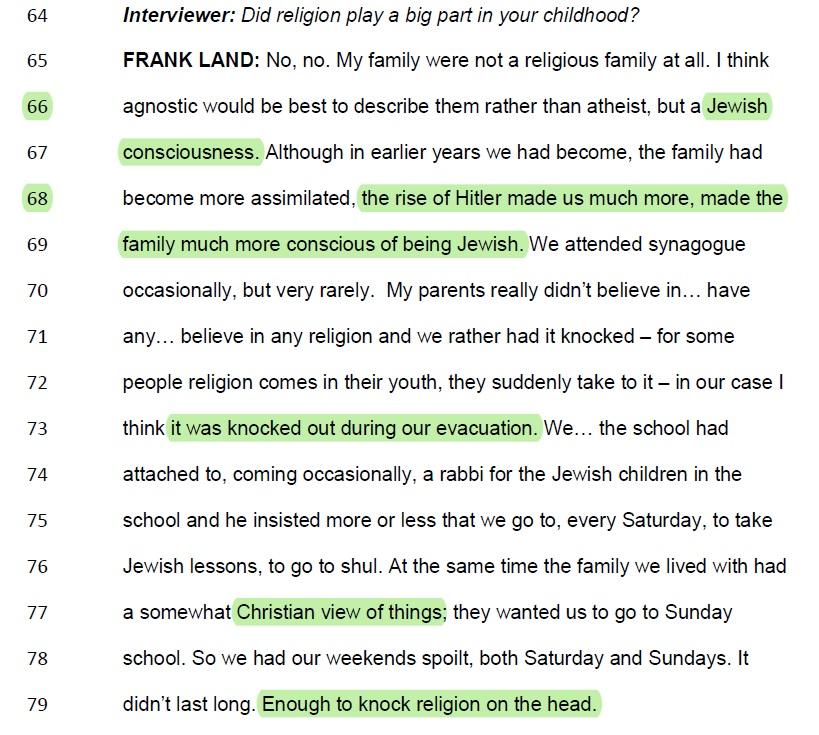Introduction
Thematic analysis is a crucial asset for organizing and analyzing qualitative data into thematical patterns. The particular themes identified within the research constitute a set of recurrent ideas, topics, and statements consistent and displayed in one piece of data or across several data points (Kerawalla, 2015). This thematic analysis will examine the interview with Frank Land held in the Oral History of British Science archive of the British Library (2010). Such a method will help identify the underlying themes discussed within the interview to analyze them from a psychological perspective. Most importantly, the thematic analysis method is a helpful tool for identifying the themes that Frank Land draws on to discuss the transitional moments in his life.
Methodology
Design
A research design for this study is a thematic analysis of the interview with Frank Land. It is a qualitative research method that helps identify, analyze, organize, describe, and report themes revealed across the target data set. It is a commonly used technique to organize data meaningfully before implementing other types of data analysis.
Participants
The research involves two participants, the interviewer and Frank Land himself.
Materials
The study requires the use of supporting materials to develop thematic analysis and further examination of the main themes found in the interview. The most helpful content implies the study materials that illustrate the in-depth definition of the analysis and its crucial components. As a rule, an interview reveals the broad areas of transformative life events, including Life chapters, key events, significant people, stresses and problems, personal ideology, and life themes (Crafter, 2015, Week 25). Additionally, it is essential to conduct external research when discussing the main themes to provide more detailed insights into the issues from the psychological perspective.
Procedures
However, thematic analysis requires specific preceding steps before conducting the research itself. More particularly, the first primary step is to prepare the data for analysis. This involves transcribing data, which significantly helps further move on to thematically analyzing the data. Given the interview type of data obtained for the research, the principal measures imply working with the coding process (Kerawalla, 2015). Interview coding refers to familiarization and coding, code development, and transition to the themes’ discussion and analysis. While reading through the interview several times, it is crucial to highlight the key moments that signify specific themes of the conversation. After that, each code has to be briefly described and categorized into a specific theme or subtheme. As a result, the coding procedure helps identify the group of central themes in the interview and attain all the relevant information for further analysis.
Ethical considerations
Psychological research and related decisions cannot exist without ethical considerations. More specifically, the ethical approach to research covers the changed opinions about issues, the treatment of research participants, the presentation and discussion of research results, as well as the drawbacks and benefits of ethical codes. The treatment of research participants is an essential aspect of empirical research (Rentfrow, 2015). As such, in order to understand whether this research is ethical, regardless of the degree of subjectivity, there is a set of common-sense questions that need to be answered to determine this. To sum up, this thematic analysis is ethical because:
- The research does not harm the participants;
- Their confidentiality is protected by avoiding any biographical facts and details but discussing only the general society-oriented topics;
- The research provides key benefits and interesting insights for enhancing the study of social psychology;
- It is a well-thought-out design aiming for valid results and thoughts for further psychological research;
- The alternative low-risk options include excluding the participants’ names, filling in a form, or a street survey.
Reflexivity
The main research question has considerably impacted the coding process as it required one to focus more on the interviewee’s life events and transitional moments throughout his lifespan. The strong statements reported by Land and phrases that make one think about the complex turn of events of his life guided my choice of quotes for inclusion in the report. I have emphasized the role of ethics in the use of pre-existing data as it is a crucial aspect in psychological research; it has to drive the benefits only. The transparency of my interpretations was checked with the existing psychological research and information discovered in peer-reviewed studies on the specific themes that align with the research topics.
Results/Analysis
Concerning the qualitative type of research, data involves collecting and analyzing non-numerical data from the interview audio clip, which helps examine and learn the concepts, opinions, and experiences. The in-depth insights contribute to generating new ideas for psychological research (Gibson, 2015). The thematic analysis defined three underlying themes that Frank Land discussed in the interview. They include change as a cultural-historical phenomenon, religious consciousness in cultural formation, and experience of racial segregation. These themes were identified with the help of the coding process, which structured the most critical point of the interview and categorized them into themes.
The first issue of the cultural-historical phenomenon and consequent change in human life can be traced to the beginning of the interview, where Land talked about the change of government in Germany and forced family emigration. Land talked about the “destruction of the Jewish community” and how his family “found themselves in a strange country” (The British Library Board, 2010, Fig. 1). In addition, the central issue was Land’s self-identity through his name, which served as a barrier to new opportunities in life and carrier: “with that name you’ll never get a job.” He had no other decision than “change his identity card” and “change his name” from “Landsberger to Land” (Fig. 2). These codes explore the cultural, historical, and social context that affects one’s life and challenges a person’s assumptions about stability and change through personal development (Crafter, 2015). Land’s experience of the war, evacuation, changed environment, and changed identity, as well as the shift in cultural perspectives, is inevitably linked to his identity development over his lifespan.
The second theme discloses religious consciousness in cultural formation, which was observed by Land from his parent’s perspective. He defined his family as “Jewish consciousness,” which was enhanced by “the rise of Hitler” because it made the Landsbergers “more conscious of being Jewish” (Fig. 3). Despite the disbelief in any religion, although with a “Christian view of things,” “it was knocked out during evacuation,” which implies the historical impact on one’s religious considerations and choices (Fig. 3). Religious consciousness has a particular impact on different elements of culture, which forms one’s religious, and moral imperatives linked to the spiritual basis of the culture (Bobyreva, Zheltuhina, Dmitrieva, and Busygina, 2018). The final third theme reveals Frank’s experience of racial segregation in his hometown as he recalled his childhood memories: restricted “Jews Only” seats in a public garden and “suddenly you had the segregation” (Fig. 4). According to Montero, Vargas, and Vásquez (2021), segregation harms psychological well-being. It was a critical lack of collective identity, which could have positively influenced Land’s transitional moments in life.
Discussion
Theme 1: Change as a Cultural-Historical Phenomenon
Individuals undergo a broad scope of life changes, whether minor or gradual alterations that lead to a modified version of an individual’s sense of self. Schaffer noted a self-system represents the multifaceted theory, wherein people develop as “who they are and how they fit into society” according to a sense of continuing identity central to personal awareness (Crafter. 2015). Self-awareness begins in childhood, and one can note that Land’s early years caused a traumatic experience in life. Therefore, there is a basic adherence to continuity of self in the course of time and place, which was continually changing throughout Lands’ childhood years.
To be more specific, the negative emotions perceived by the child might influence a constant struggle oneself to develop consistency between the desired self and the one attributed by other people. As a result, the child struggles by trying to fit into the normative expectations established by society’s cultural and historical expectations. Crafter (2015) has noted how Vygotsky and his socio-cultural theory explain the study of social, cultural, and historical processes in psychology. He believed that psychological phenomena are “mediated by interactions with tools or artifacts” (Crafter, 2015, p. 213). Based on Land’s interview, such tools were presented by his cultural identity, name, origin, and even language. They defined his social interactions in the future. With this said, theoretical ideas suggested by Vygotsky reveal how cultures, social contexts, and even history play a crucial role in shaping identities in Land’s transitional moments in life.
Theme 2: Religious Consciousness in Cultural Formation
In the second theme, one can trace the inherent role of the significant people in the interviewee’s life, such as family. Given that culture represents a global system of personal beliefs and values, religion plays a pivotal role in establishing the cultural imperatives oneself. Religious consciousness is built upon “two basic layers,” religious philosophy and religious psychology (Bobyreva et al., 2018, p. 2). According to the interview with Land, the role of religion in his life and family was very vague. Despite being close to atheistic and non-religious views, his family became Jewish consciousness in the crisis time of Nazi Germany.
Additionally, he was forced to attend the Christian church on Sundays, mixed with Jewish beliefs. The research conducted by Sharma and Ryan (2018) provides crucial insights into the psychological aspect of religion. The human capacity for consciousness and reason is regarded as a remarkable gift that one can have. It is applied to “successive phases of the flux” of the individual’s inner life (Sharma and Ryan, 2018, p.112). Moreover, human beings have to experience the pain of their limitations to mature to a higher state of consciousness, which happened to Land’s family during the war. His family’s anti-religious attitudes can be explained by the western approach to materialism in understanding the connection to the divine. Becoming religious also defines the person’s individuation process, impeded by the external cultural restrictions and transformations in Land’s life.
Theme 3: Racial Segregation
Culture, education, religion, and social structure directly impact the level of self-worth. However, it was a damaging process in Frank Land’s story, as segregation was the most significant and detrimental event. In the psychological theory, segregation is associated with the human tendency towards categorization. It is a fundamental psychological function that is important for “routine activity” (Enos and Celaya, 2018, p. 28). Concerning social categories, such as one’s ethnicity or race, categorization promotes stereotyping and, thus, segregation of the groups. Based on Enos and Celaya’s (2018) hypotheses, Land experienced the increased perceived differences between groups and group-based discriminatory behavior and attitudes, which impacted his opportunities in the future. With this said, segregation also enhances the salience of social categories.
Conclusion: Evaluation of Results
The thematic analysis indicated the fundamental psychological and socio-cultural aspects of the life of Frank Land, which were further examined from the theoretical approach. With regard to the research question, Land draws on the most vital life concerns, including internal and external changes in his life and sense of self, religious consciousness, and racial segregation. Altogether, they considerably impacted and shaped Land’s self-identity through cultural-historical factors and his cultural formation. The transitional stages shaped Land’s future perception of self and the potential success of adherence to social groups and norms. With the help of external research data, each of these themes was analyzed in-depth to better understand Land’s transitional moments in life and their impact on his self-development. The research question guided the primary focus of choosing the correct data to analyze for this study and provide practical implications.
References
Bobyreva, E., Zheltuhina, M., Dmitrieva, O., & Busygina, M. (2018). Role and place of religious consciousness in culture formation. SHS Web of Conferences, 50, 01035. Web.
Crafter, S. (2015). Can people really change? Changing self-identity and ‘other’ relationships across the lifespan. In R. Capdevila, J. Dixon, and G. Briggs (Eds.), Investigating psychology 2: From biological to developmental (pp. 201–237). Open University Press.
Crafter, S. (2015). Week 25 study guide. DE200 Investigating psychology 2. The Open University.
Enos, R. D., & Celaya, C. (2018). The effect of segregation on intergroup relations. Journal of Experimental Political Science, 5(01), 26–38. Web.
Gibson, S. (2015). Week 2 study guide. DE200 Investigating psychology 2. The Open University.
Kerawalla, L. (2015). Addressing qualitative data through thematic analysis. In R. Capdevila, J. Dixon, and G. Briggs (Eds.), Investigating psychology 2: From biological to developmental (pp. 222–258). Open University Press.
Montero, R., Vargas, M., and Vásquez, D. (2021). Segregation and life satisfaction. Frontiers in Psychology, 11(604194), 1–11. Web.
Rentfrow, J. (2015). Week 20 study guide. DE200 Investigating psychology 2. The Open University.
Sharma, M., & Ryan, J. F. (2018). A journey of awakening: The emergence of consciousness. MOJ Yoga & Physical Therapy, 3(4), 110‒114.
The British Library Board (2010). National life stories. An oral history of British science. Frank Land interviewed by Thomas Lean. C1379/17. Web.
Appendix A



